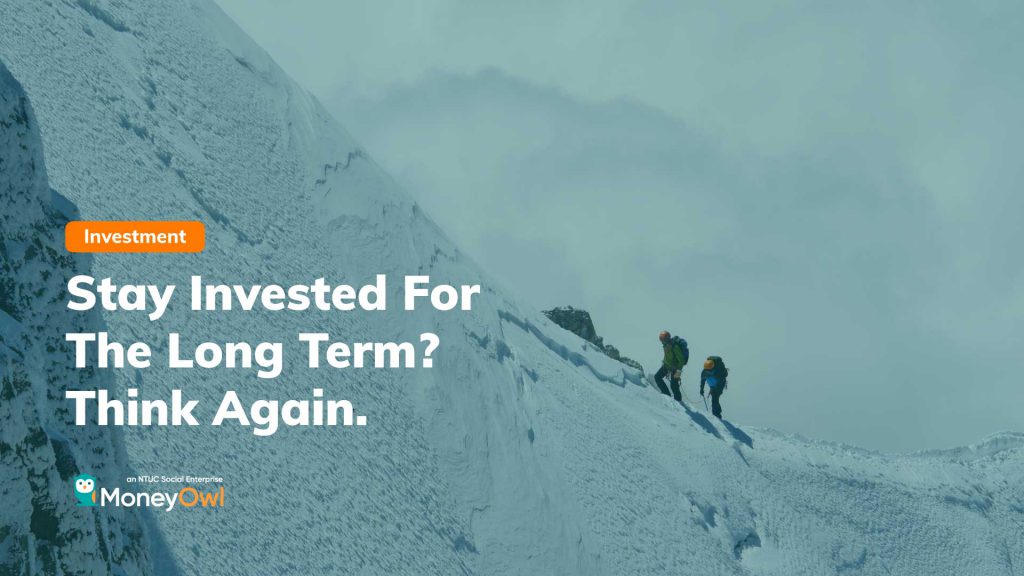Note: It was announced in November 2023 that MoneyOwl will be acquired by Temasek Trust to serve communities under a re-purposed model, and will move away from direct sale of financial products. The article is retained with original information relevant as at the date of the article only, and any mention of products or promotions is retained for reference purposes only.
______________
Do ask yourself if you currently have the ability to stay invested for the long term with the proper financial instruments.
The last two months have been a crazy time for those of us who are invested in the equities market. The US market went up 10% in one day and then came down 12% on another. On the day when it came down 12%, it was the biggest fall in one day since 1987. On another day, the S&P500 was up 9.4%, the biggest one-day gain since 2008! But despite the huge gain, the S&P500 has fallen about 20% from its peak as at the time of writing.
So, it has been a busy time for MoneyOwl as we spent time engaging clients, explaining to them what has happened to the markets and what the governments around the world have been doing to prevent an economic crisis to become a financial one. We wrote emails after emails, produced articles and videos, assure them that this pandemic will pass, and the markets will recover again. We met up with clients and went through their retirement and investment plan, showed them that they need to stay invested to get the returns they need and that they had the ability to do so even though they may feel a bit nervy today. The message from us was clear: Don’t be affected by news headlines. Stay invested and keep investing for the long term.
Then as I was surfing the various platforms on social media, I realised that almost everyone, from investors to advisers were sending the same message. And that got me a bit worried. Why so? Let me explain.
Why did we coach our clients to stay invested?
To explain why to allow me to share an extract from one of MoneyOwl CEO/CIO Chuin Ting Weber’s recent market update to clients.
‘On what do we anchor our faith? On data and evidence. We never know when it would bottom, though we know from history that the stock markets always bottom before the “real” data improves, be it credit markets versus high yield bond defaults, or bank stocks versus bank losses and so on. More importantly, we know that through big and small crises over the last 100 years, the stock market always recovers and goes up over the long term. And there is a high chance it will recover strongly when it does. Because earnings will come back as demand comes back, and ultimately demand is driven by global population growth. Some companies will die but others will thrive, and a globally diversified investor will effectively buy them all (we have more than 8000 in our MoneyOwl portfolios!). This is the evidence-based premise of MoneyOwl’s investing philosophy.
Some have said that this time is different, because it feels like war. Yes, it definitely feels bad, not least because investors are affected in their own daily lives beyond their investment portfolio. And some of the emergency measures, panic buying, shortage of toilet paper and so on, are indeed reminiscent of war times. A US Senator said the stimulus was a “wartime level” of investment. But guess what? In this war, every single Central Bank, every single government is on the same side, alongside every business and every household, every school and every parent. Every. Single. One. And everyone will do whatever it takes to win this war.
So we keep the faith amidst the brutal facts in the short term, because the faith in our long-term destiny is ultimately our faith in humanity’s ability to overcome, as we have done in the past. Once again, our economies will grow on the back of human innovation, industry and our collective and relentless pursuit of a better life. Together, or probably preceding this, the stock market will go up again. We do not know exactly how long the pain would last or when the upturn would come, but come it definitely will!”
Staying invested through the various crises helps you capture the returns from the stock market.
In the same vein, at a recent webinar on Investing In Turbulent Markets conducted by MoneyOwl in collaboration with Dimensional Fund Advisors – our fund management partner whose funds makeup MoneyOwl’s portfolios, the following charts were shown:
First, a chart to show that the stock market goes through all types of different crises now and then, but always recovers and rewards investors with a positive return.
Staying invested through the various crises helps you capture the returns from the stock market. The world has come through various challenges before, and it is likely to do so again this time. Most importantly, you want your portfolio to be positioned to benefit from it by being invested in the markets when the recovery happens. When that happens, it is usually a big rebound as we can see from the data below, also discussed at the webinar.
On the question of whether one should try to take risks off the table now and only get back after markets have bottomed, the problem is that it is hard to catch the rebound, and missing just a short period of positive returns can affect your wealth accumulation significantly, as this chart below shows.
As an adviser, I have gone through many market crashes, the biggest one being the 2008 Global Financial Crisis (GFC). Even that passed and we saw how the US market has recovered strongly since then.
But here is the thing: You noticed that the charts we used (and for that matter, most people use when encouraging investors to stay invested) are indices. You can’t invest directly into an index, but you can do it either via an indexed fund, such as those from Vanguard (unfortunately not available to retail investors in Singapore) or ETFs on US stock exchanges by SPDR etc. Alternately, you can invest into the markets via market-based funds such as those from Dimensional Fund Advisors.
And when you invest using an index fund, ETFs or market-based fund:
- You are invested in a huge diversified portfolio of securities and not just a few.
- You always stay invested as these funds do not attempt to move in and out from markets because that is not their mandate. Their mandate is to remain invested in the market at all times!
So, what does all this means?
- This means that if you are only invested in a few securities whether they be stocks or bonds, you should not just listen to anyone to stay invested and keep investing without knowing whether the companies that you are investing and remain invested in may go bust. There is a real possibility you can lose a lot of or all your capital because you are so concentrated.
- This also means that if you are invested in actively managed funds and not index funds or market-based funds, the whole idea of staying invested so that you can capture the strong returns when recovery happens, may not work for you. This is because there is a real possibility that while you remain invested in these funds, the fund manager has already “de-risked” the portfolio and sold part of the equities to cash in order to minimize the loss or hold cash to try and time his entry once he thinks markets have bottom. Also, it is possible for a bond fund, such as a global bond fund with a very broad mandate to be buying into lower-quality bonds that may give higher yields during the good time but tank during times like this. We are already seeing a lot of stress in the bond market, especially in the high yield bond segment.
What happened in the Global Financial Crisis in 2008?
In 2008, the above was exactly what happened. While investors were told to not panic, remain invested, and don’t time the market, active managers were selling to cash to minimize losses. And when the recovery started after March 2009, it caught many of them by surprise. Also, at that time, there was a global bond fund in Singapore that was falling in prices by the day. When they were asked to show the securities they were holding, it was shocking to find out that many of the bonds they bought were lower quality ones and eventually, this fund went belly up.
So, is this still happening today? In an article dated 9 March 2020, Financial Planning Magazine reported:
“After a decade-long uphill battle against passive investing, active funds are getting a rare moment of respite, courtesy of the worst equity sell-off since 2018.
About 60% of large-cap mutual funds beat their benchmarks as the S&P 500 tumbled into a correction in February, the best hit rate in two years, according to data compiled by Bank of America. The outperformance was achieved when the average fund only fell 7.8% over the stretch in question.
This is what life has become for active managers, trying to sell something whose main claim to value is that it fails at a slightly less horrifying rate when shares tumble. That’s how it sometimes seems, going by the last few stock routs: long-only mutual funds are mainly good at beating benchmarks in down markets, while trailing when things are going up.
“It’s frustrating,” said Jeff Sica, chief investment officer of Circle Squared Alternative Investments in Morristown, New Jersey. “The angst of most active managers is that their only time to shine seems to be where the market is collapsing.”
Sica said fund managers have been able to weather the market storm partly because they quickly cut risk. Theoretically, raising cash or trimming big losers would allow a portfolio to avoid deeper losses. During the latest sell-off, money managers have been selling stocks at the fastest pace since 2014, according to a survey by the National Association of Active Investment Managers.”
‘Stay Invested’ – Do not follow this blindly
So it seems that it is the same today, while you may believe in staying invested for the long term, the active managers that you are invested in are selling their positions to raise cash and cut risk so that they “fail at a slightly less horrifying rate when shares tumble”. And if they fail to go back to the market in time, you are going to be let down when the market recovers. And chances are, you will be let down as evidence has shown that most active managers do not do better than the market in the long run. For those that do, they do not do it consistently.
Especially for actively managed funds
So, if you are invested in a few individual securities and/or actively managed funds, do not just follow the advice of “staying invested” blindly. Before you do so:
- Please check your individual stocks and bonds that you are holding to, whether they are worth holding on to for the long term.
- Please check the funds that you are invested in, if they are actively-managed funds, you may not fully be invested even if you did not sell down and when the markets recover and they will, you might not participate in the recovery because your managers are partly in cash. You may wish to check if your funds have done that.
- If you are invested in a bond fund, you might want to check what these funds are invested in. Not all bond funds are the same and not all survive in a market crash.
Remember to consider the instruments you’re invested in
So, the next time you hear this advice “stay invested for the long term”, do consider the instruments that you are invested in and see if you are really staying invested or should stay invested in. In addition, do ask yourself if you currently have the ability to stay invested for the long term. If you have a well-thought-out plan before you invested your money, you probably would be able to weather the storm. But if you are unable to, you probably should do something about your situation before it is too late.
Christopher Tan is Executive Director, MoneyOwl, Singapore’s First Bionic Financial Adviser and also CEO, Providend, Singapore’s First Fee-Only Financial Adviser. MoneyOwl and Providend are associate companies and share the same investment philosophy. This article is an edited version of an original article of the same title, first published on Providend on 26 March 2020.
Disclaimer: While every reasonable care is taken to ensure the accuracy of the information provided, no responsibility can be accepted for any loss or inconvenience caused by any error or omission. The ideas, suggestions, general principles, examples and other information presented here are for reference and educational purposes only and are not meant to be a substitute for professional investment advice. The information and opinions expressed herein are made in good faith and are based on sources believed to be reliable but no representation or warranty, express or implied, is made as to their accuracy, completeness or correctness. Expressions of opinions or estimates should neither be relied upon nor used in any way as an indication of the future performance of any financial products, as prices of assets and currencies may go down as well as up and past performance should not be taken as an indication of future performance.
The author and publisher shall have no liability for any loss or expense whatsoever relating to investment decisions made by the reader. This article should not be construed as an offer or solicitation for the subscription, purchase or sale of any fund.
Announcement: With effect from 1 June 2022, MoneyOwl is a 100% NTUC Enterprise (NE)-owned company.




